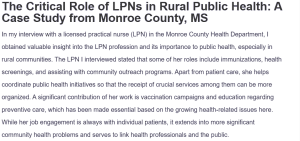The Critical Role of LPNs in Rural Public Health: A Case Study from Monroe County, MS
In my interview with a licensed practical nurse (LPN) in the Monroe County Health Department, I obtained valuable insight into the LPN profession and its importance to public health, especially in rural communities. The LPN I interviewed stated that some of her roles include immunizations, health screenings, and assisting with community outreach programs. Apart from patient care, she helps coordinate public health initiatives so that the receipt of crucial services among them can be more organized. A significant contribution of her work is vaccination campaigns and education regarding preventive care, which has been made essential based on the growing health-related issues here. While her job engagement is always with individual patients, it extends into more significant community health problems and serves to link health professionals and the public.
Notably, the path that led this LPN to public health nursing was somewhat complex. With the LPN degree in hand, she began clinical work-nursing homes and private practices were her primary venues. A desire to have more impact in the community drove the nurse toward public health. She reiterated that learning continuously and gaining extra certification was critical to her career; public health nursing required an understanding of policies and procedures, unlike the clinical care method. Transposing from a clinical perspective, where the care is generally focused on the individual, to a public health perspective, which views health from a broader scale in the community, took dedication and flexibility in learning.
Subsequently, while the LPN has experienced several successes within the existing position, challenges have existed. The nurse shared the success of the department’s vaccination and health screening programs, reaching more individuals than in years past, especially within underserved communities. Early detection programs for illnesses such as high blood pressure and diabetes have helped clients gain control over their health before complications arise, as indicated by Madela et al. (2020). However, practicing in a rural setting like Monroe County has significant challenges. One important challenge concerns financial and personnel resources. Most rural areas are short-staffed, which poses difficulties in covering essential public health services. Besides, the public sentiments regarding health programs, including vaccines, have complicated the work for LPNs since they face resistance to promoting these essential health interventions.
Consequently, the LPN gave several pieces of advice that are worthy for students joining the public health field. She emphasized working in the field as a student, and while classroom learning is quite important, there simply is no substitute for real-world exposure. Additionally, she said candidly that students must go out and actively create opportunities for internships, volunteering, or shadowing in public health. Another key point shared was communication. Much of a public health worker’s role involves breaking down health information into terms comprehensible to the general public (Mhlongo et al., 2020). Trust and rapport, then, become necessities for effectiveness in necessarily effective public health.
Besides, the LPN has much hope for the future of public health rather than a challenge. She envisions that technology might play a vital role in eliminating specific barriers to rural healthcare through broadening telehealth services. Prevention will always remain better than treatment; hence, efforts will be made to eradicate social determinants of health and disparities in access to health care. Still, with a lack of increased funding and specific missions to implement such change, progress will be slow in rural areas like Monroe County.
In summary, the interview gave me a complete view of the critical role of public health nurses in the community, especially those in need. Hearing from her the challenges and rewards of the job firsthand has deepened my appreciation for the work that public health professionals do and reinforced my desire to pursue a career in this field.
References
Madela, S., James, S., Sewpaul, R., Madela, S., & Reddy, P. (2020). Early detection, care and control of hypertension and diabetes in South Africa: A community-based approach. African Journal of Primary Health Care & Family Medicine, 12(1). https://doi.org/10.4102/phcfm.v12i1.2160
Mhlongo, E. M., Lutge, E., & Adepeju, L. (2020). The roles, responsibilities and perceptions of community health workers and ward-based primary health care outreach teams: A scoping review. Global Health Action, 13(1), 1806526. https://doi.org/10.1080/16549716.2020.1806526
ORDER A PLAGIARISM-FREE PAPER HERE
We’ll write everything from scratch
Question 
Assignment #8 (30 points)
PH 600
Public health professionals work in a variety of settings and hold a wide range of jobs. Identify someone currently working in the field of public health and conduct a phone or video interview with them (see sample questions below).
Once your interview is completed, write a 500-word reflection on your discussion with this public health worker. Your reflection should be in paragraph format and should not simply respond to the bulleted questions below. If you have trouble identifying a professional to interview, reach out to Dr. Edet well in advance of the due date.

The Critical Role of LPNs in Rural Public Health: A Case Study from Monroe County, MS
Sample Interview Questions:
- What is your current position and what are your job responsibilities?
- What was the educational and professional path that led to your current position?
- What are some of the successes and challenges you’ve faced in your current position?
- What recommendations/advice do you have for current public health students?
- Where is the field of public health going in the future?